Filed under: Anti-Patriarchy, Editorials, Indigenous, Mexico, Southern Mexico
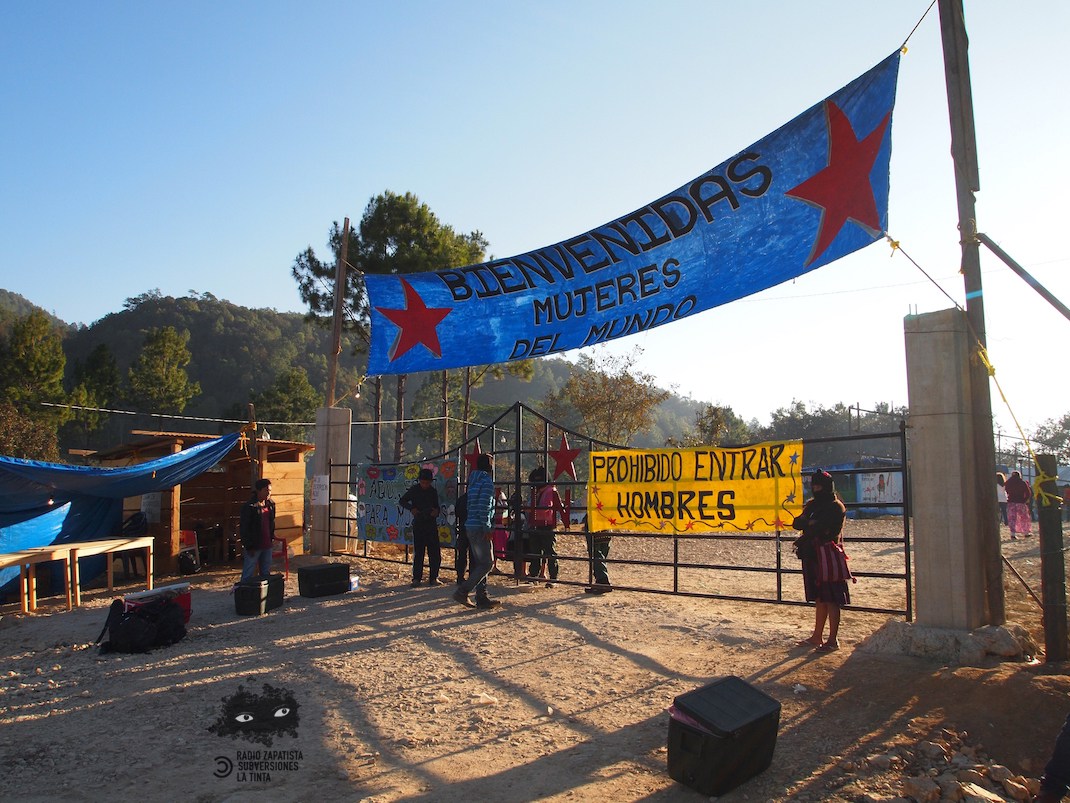
The following is a “chronicle and reflection after the First International Gathering of Politics, Art, Sport, and Culture for Women in Struggle” organized by Zapatista women and held in Chiapas, Mexico from March 8-10. The article and photos were produced collaboratively by Radio Zapatista, Subversiones, and La Tinta, and translated into English by E. Rose.
[…] perhaps, when the gathering is over, when you all return to your worlds,
to your times, to your ways, someone will ask you if we reached some agreement.
Because there were many different ideas that converged in these Zapatista lands.
Maybe then you answer no.
Or maybe you answer yes, we did reach an agreement.
And maybe, when you are asked what the agreement was, you say we agreed to live,
and since for us to live is to fight,
we agreed to fight, each person in her way, her place and her time.
Opening speech. Compañera Érika
Caracol IV, Whirlwind of Our Words. Morelia, Chiapas. There where the stars shine brightest, where the territory is most free, there where Zapatista women opened their home to receive thousands of women from all over the world. Some of us took hours to arrive, other days. Many of us knew the history of Zapatismo and the rebellion of its women, some of us knew of the importance of the Revolutionary Law of Women for the indigenous communities, and others had hardly heard of the Zapatista Army of National Liberation in the Mexican southeast.
While the International Women’s Strike caused thousands of women around the world to suspend their work and go out on the streets of their cities, thousands of others responded to the Zapatistas’ call. Arriving was not easy. Many were unable to. Everyone convened under the same cry: to be women who fight.
It happened over three days, from March 8th to 10th, during which we gave each other joy, visions, words, dances, poems, paintings and “strange things,” the Zapatista women would say. For a fragment of time we condensed ourselves into the same latitude. Each one with her feelings and her struggles traveled there and presented her pains, her smiles, her strength of being a woman in chants and cries that resounded in the hearts of those who were there. And they echoed into the forest that surrounded us out to unimagined corners of the planet. We had a conviction: from different latitudes, all together during those days, we made the world tremble.
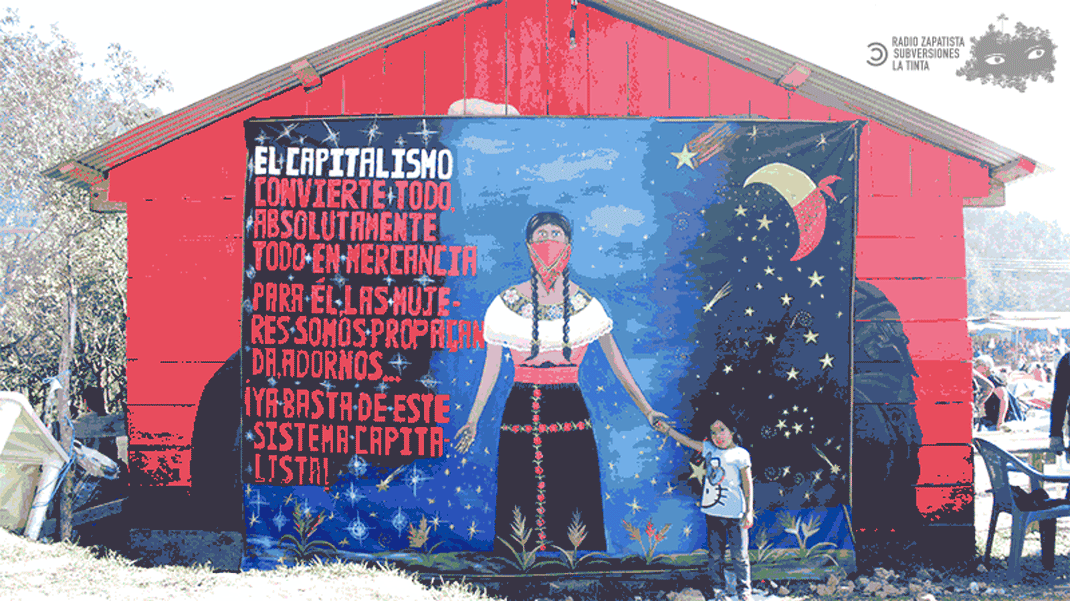
The Zapatistas chose International Women’s Day to start the First International Gathering of Politics, Art, Sport, and Culture for Women in Struggle, in “November 17th,” one of the three Zapatista Rebel Autonomous Municipalities of Caracol IV, “Whirlwind of Our Words” in the area of Morelia (which overlaps with the territory officially belonging to Altamirano), and seat of the Good Government Council “Heart of the Rainbow of Hope.” This region is also known as the Tzotz-Choj (bat-jaguar) zone, in reference to a former ruler of the city of Toniná and where the Tzeltal, Tzotzil and Tojolabal Mayan peoples continue to live.
This region, like many others in Chiapas and Mexico, has been and currently is the site of peasant and territorial defense struggles. In the case of the Zapatistas it went further, with the creation of their own government and the building of autonomy through events in which the participation of women continues to be crucial.
The place where this international gathering was held, one of the largest so far, was part of a cattle ranch taken by Zapatista bases. This autonomous municipality was the scene of one of the largest land seizures after the armed uprising in 1994.
Currently, and as we could observe both on the journeys coming and going, the passage of trucks loaded with wood is constant. The large sawmills in the hands of local power groups from the Ecological Green Party [the ruling party in Chiapas] are one of the many expressions of looting and dispossession of natural commons in this and other regions; they are part of the infrastructure and development megaprojects of large national and international capital.
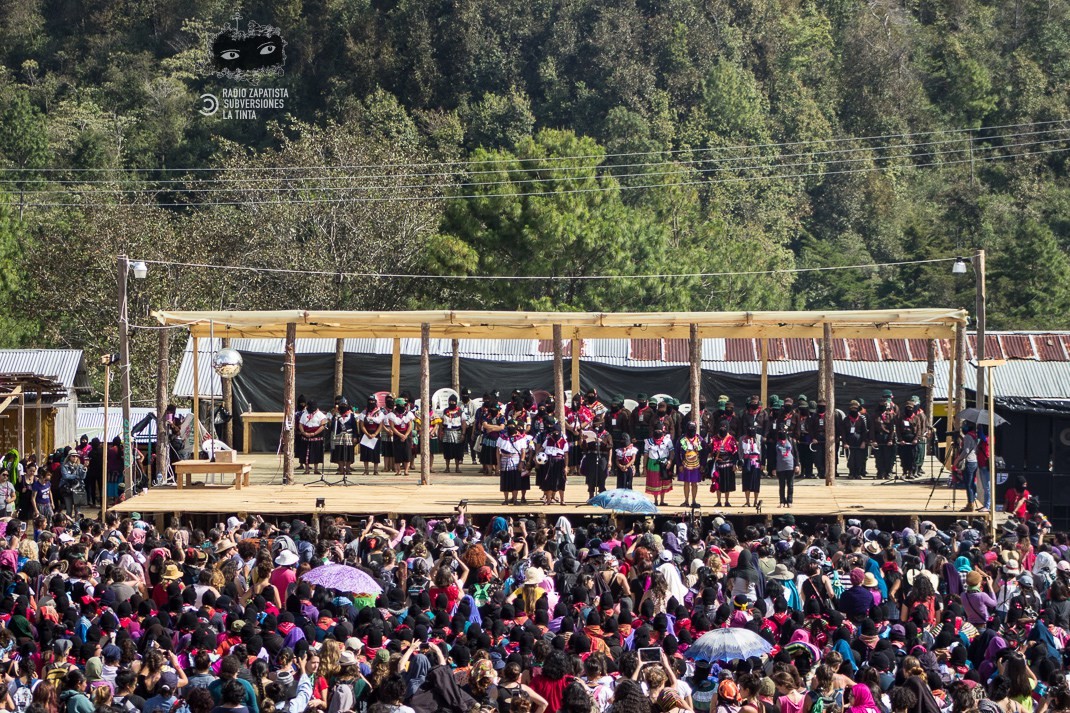
Could it be that it went well?
[…] where you would sleep, where you would eat,
where you would bathe, where you would go to the bathroom,
the sound, the lights, the water,
what we would do if you got sick, what we were going to say to you,
how we would talk to you, and how we would listen to and see you.
Closing speech. Compañera Alejandra
The questions that the Zapatista compañeras asked themselves during the months that it took to organize the meeting kept them awake and without an appetite for a long time, according to what they told us. Organized from below and on the left, seeking the agreement of the Zapatistas of each of the communities; it was not an easy task, but they did it. Given this, the phrases “thank you” and “long live the Zapatistas” were frequently called out during the hundreds of activities that were carried out. Thanks to the Zapatistas for receiving us in their territory. Thank you for providing food for three days to more than five thousand women. Thank you for providing us with water to drink, to use the bathroom, to take showers. Thank you for the words, each one that you said to us and each one that you all listened to from our mouths. And above all, thanks for those looks in which we recognized each other through bandanas and ski masks, mascara and glasses, scarves and hats covering us from the sun.
Carolina and Marina are Zapatista women who arrived from the Caracol III La Garrucha. Their role was that of coordinating the organizing of the event along with 60 other compañeras from the other Zapatista caracoles. In an interview, they told us that they and their compañeras felt proud of being able to organize this gathering, unprecedented in the history of Zapatismo: “It is the first one that is only for women, there have been others, but never like this one that does not permit men to enter because this gathering is organized only by women.”
They also told us that the event was underway since July, 2017, when they proposed it: “[…] So we had many meetings to plan it. It was hard for us to do it, because we had never done it, yes with the help of men, but in this case, it is only women who organized it and who envisioned what it would take to receive you all.”
After the first meeting in July, the delegates took the proposal for the gathering to their communities, where it was only women (and every one of them) who decided to convene us: “It went to the villages where the Zapatista compañeras are, to each town to ask if this gathering would happen. Then they said yes and that’s where the planning was begun,” Carolina and Marina tell us. “To organize this event that today was very difficult for us. We have never done this before. It took a lot of work because we started to see that a lot of things were needed and then we had to prepare ourselves to be able to do it. ”
It wasn’t just the coordinators who had tasks before and during the gathering. Each of the Zapatista women who attended actively participated in some way in different roles. In this way, the insurgents and militiawomen were in charge of watching over the area so that men would not enter. Other compañeras took care of hygiene issues, others were in charge of driving the trucks that entered and left the premises of the gathering, either transporting food or garbage. There were also doctors and health care providers. The Tercias Compas filled technical roles for sound and light and were also in charge of communication and the maintaining a complete recording of the event.
On March 8th, the Zapatistas presented their contribution, while on the 9th and 10th the activities of the women who came from different parts of the world took place. More than two thousand compañeras from Zapatista support bases were present in each of the activities. Regarding this, Carolina and Marina explained the work of the support bases: “to witness you all and also to participate in every activity that you do so that they can return to their towns to explain they saw and experienced of you, what it was that you all presented. Because this is how we are, we take into account everything we see and it must be brought back to the communities.”
Many Zapatista women put their energy into this gathering for months and that was noticeable in the extensive organization: five dining rooms, dozens of workshops, talks and screenings, soccer, volleyball and basketball games. Each activity was massive and occurred simultaneously with other activities; while some participated in a healing ritual around the fire, other compañeras watched a play, talked about the violence in our bodies and our territories, or participated in a collective mural.
A huge campsite, two rooms and various living spaces sheltered thousands of women from the damp cold of the Morelia night. The Zapatista compañeras had the support of a team of women in charge of responding to emails, handling registrations, and organizing transportation, schedules and activities prior to and during the gathering. In the closing remarks, they thanked everyone for their support, as well as that of the compañeras who stayed in the communities taking care of the families, the animals, the houses, the barracks, the fields, vigilant so that “bad governments” would not do anything against the gathering.
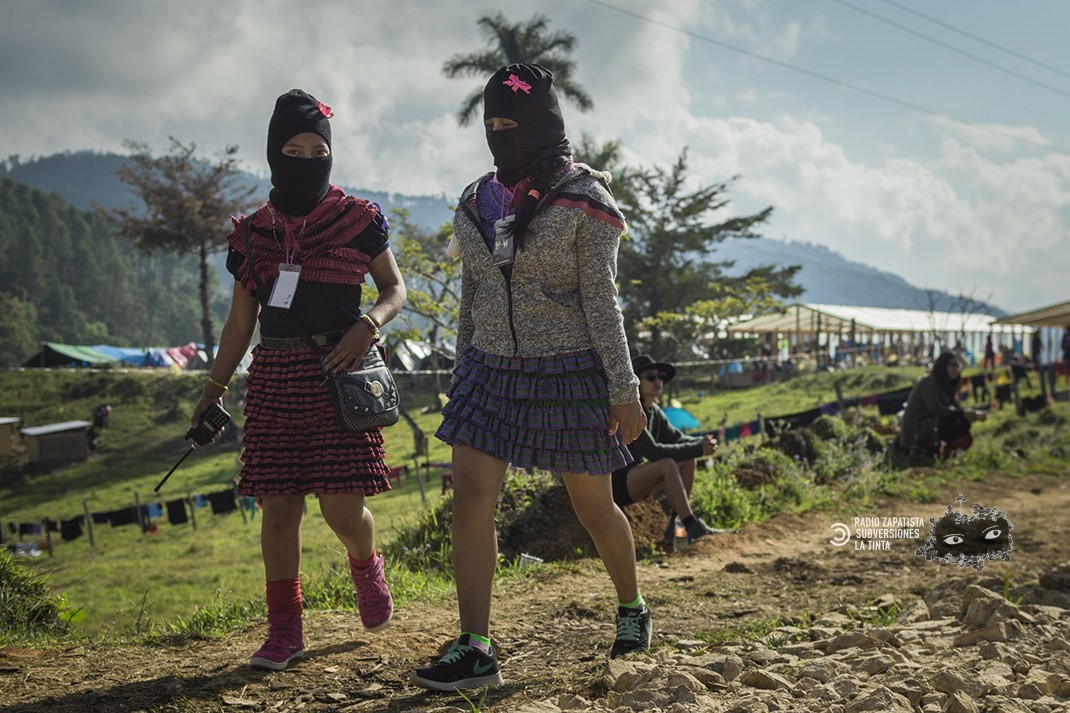
Scrambled words
(…) Six Zapatista women would have come for each one of you:
a “pipsqueak” (that’s what we call babies who’ve just been born),
a little girl, a teenager, an adult, an elderly woman, and a deceased woman.
All women, all indigenous, all poor,
all Zapatistas, all embracing you
because it’s the only gift we can give you in return.
Closing speech. Compañera Alejandra
Insurgent Érika read the opening speech. Accompanied on the stage by other insurgents, militia and compañeras with positions in the Good Government Councils, she began by sending an embrace to Eloísa Vega Castro, from the support networks of the Indigenous Governing Council (CIG), who died while accompanying the CIG delegation on February 14th.
They told us that their job was to take care of the place so that men would not enter: “Because as we know, they are tricky.” All the women listening attentively to the opening words released a knowing laugh (like many that would happen throughout the event).
The Zapatistas did not hesitate to make clear that their word is collective and necessarily impregnated with different ages, histories and languages. Through Erika’s voice, many spoke. She told us how her life was marked by having grown up in the Zapatista resistance and rebellion of her grandmothers, her mothers and her older sisters. She told us about her work without pay as a servant in a house, when she did not know how to speak Spanish; how she found out there was an organization that was fighting and began to participate as a support base and to study while collaborating in collective work with other women. In their underground meetings and political studies, the anger and courage to confront the military patrols that surrounded their communities grew and, without fear, they took up arms.
The Zapatista compañeras remind us that it’s not only capitalism that seeks to destroy us, but we must also fight against patriarchy, that system that “makes men believe and think that women are less than and that we’re not useful.” But not only men, the Zapatistas clarify for us, “there are also women from the cities who despise us because we do not know about the women’s struggle, because we have not read books in which feminists explain how it should be and so many things they say and criticize without knowing how about our struggle.”
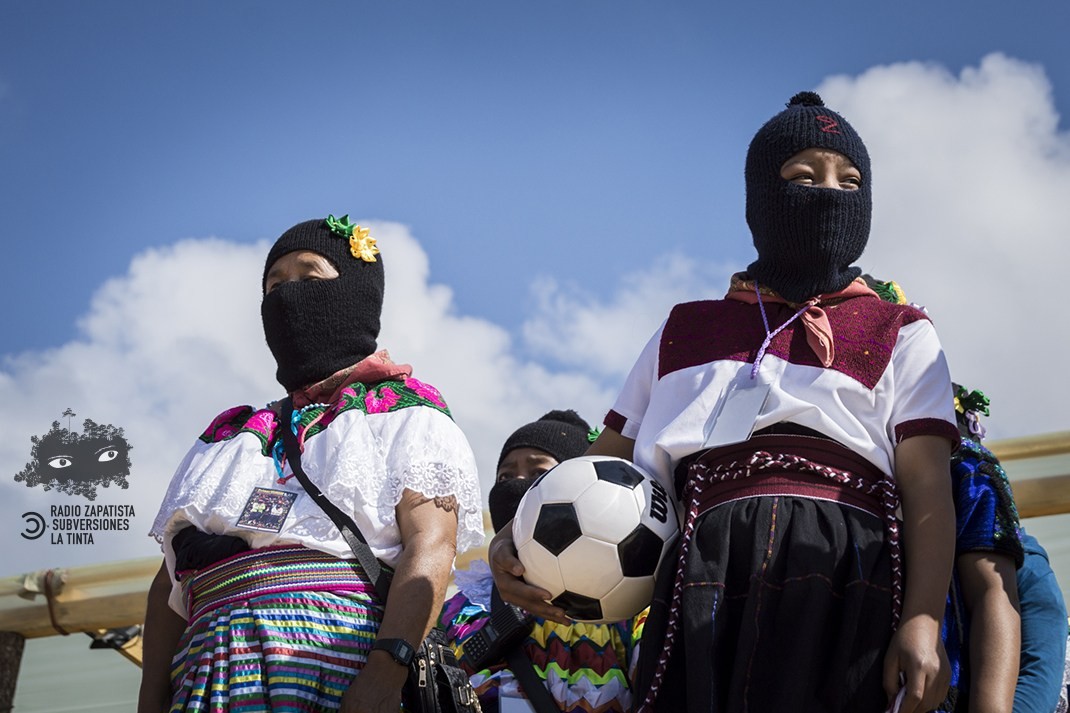
A forest of women
There was no way one collective was going to be able to organize all that.
That’s why more than two thousand Zapatista women from the five caracoles were here.
And maybe that wasn’t even enough, because there are about five thousand of you,
though some say eight thousand and others say nine thousand.
We can only guess exactly how many women in struggle were here over the past few days,
but we think we can all agree that there were a shitload of us.
Closing speech. Compañera Alejandra
The Zapatistas know that there are different ways of naming that number of trees that surround the place where the gathering took place, and that each tree that is part of that forest or mountain is different. Whatever we call that set of trees, it allows us to think of ourselves, women, “different and equal” at the same time. Starting from the fact that our colors, sizes, languages, cultures, professions, trades, thoughts and forms of struggle are different.
There was a large sign on the door that read “Men are prohibited from entering.” The call was clear. The call was for us.
They told us that we could choose between competing or listening and speaking and that whatever we chose, it was going to be our decision. If we decided to compete, in any case, there would be no men to tell us “who wins and who loses.” If we chose to give ourselves dance, music, film, video, painting, poetry, theater, sculpture, fun, knowledge, it would not be under the eyes of any men either. The choice was clear: we agreed not to compete and respect our diversities. To see each other and embrace each other in circles of countless bodies, while shouting “fight, resist, our agreement is to live!” The agreement to live was made between rural and urban women, indigenous, self-organized, artistic, feminist fighters from five continents.
Carolina and Marina, the coordinators we interviewed, told us: “We see that the situation that exists that many women are being murdered. What fault is it our ours as women that they go on killing us daily? So then, that’s why it’s better we have this gathering to see what we can do or if we agree that they continue to kill us every day or what we should do together as women. That’s why this was done, to see if we want to stay alive, because we have to do something.” The first thing, in the words of the compañeras, is “to not sell out, not give up, not give in.”
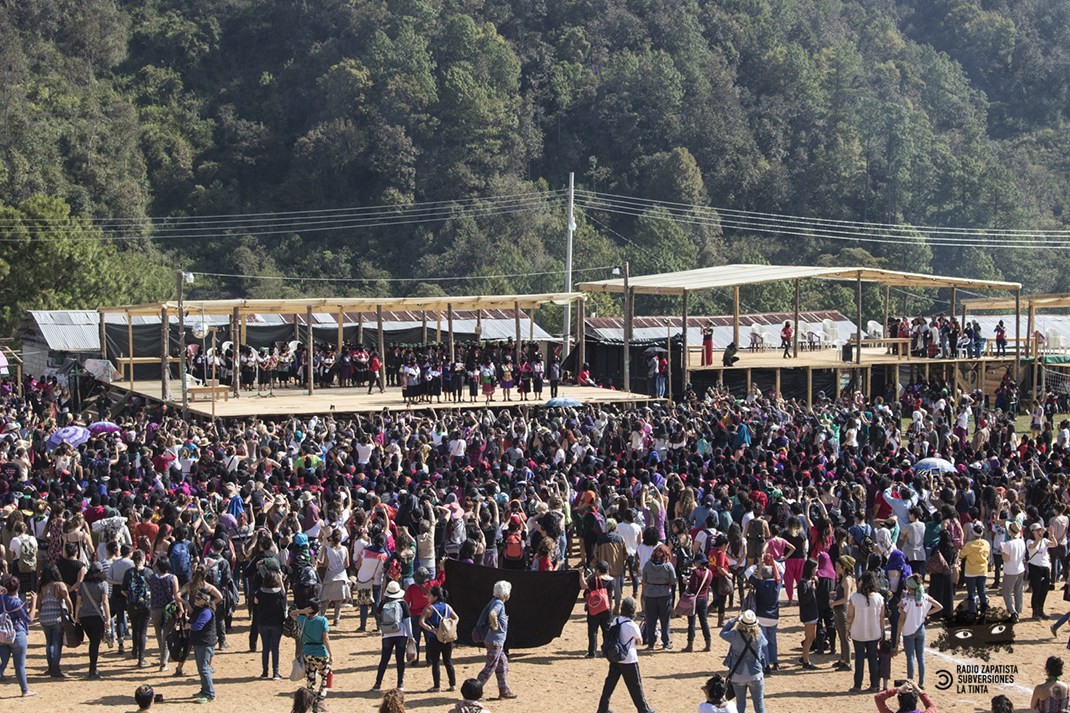
Lights on the sky of Morelia
Take the light to disappeared women. Take it to murdered women.
Take it to incarcerated women. Take it to women who have been raped. Take it to women who have been beaten.
Take it to women who have been assaulted. Take it to women who have been subjected to all kinds of violence.
Take it to women migrants. Take it to exploited women. Take it to deceased women.
Take it and tell each and every one of them that she is not alone and that you are going to struggle for her;
that you are going to struggle for the truth and justice that her pain deserves;
that you are going to struggle so that the pain she carries will not be repeated
in another woman from any world.
Closing speech. Compañera Alejandra
On the night of March 8th, the Caracol was completely dark. In one of the two-story auditoriums and along the soccer field, the Zapatista compañeras simultaneously lit more than two thousand candles. A small light so that, once the gathering is over, we will take it to our lands. To re-ignite it in our hearts, in our thoughts and in our bones.
Earlier we had heard the opening speeches and the story of the compañeras from each Caracol, also expressed artistically in plays and in the voices of the women of Dignidad y la Resistencia, a band from Oventic.
They also made several proposals, to which we all agreed. We agreed to “stay alive and keep fighting, each person according to her way, her time and her world.” We agreed to study, to analyze and to discuss in our collectives the patriarchal system, and if possible, “to name who is responsible for the pain we have.” And we also agreed to meet again in a second gathering next year, “but not only here in Zapatista lands, but also in your worlds, according to your times and ways.”
There remains the urgent need to illuminate ourselves together, to share these lights and take them to other women: “Take it and, perhaps, it will come to mind that there will be neither truth, nor justice, nor freedom in the patriarchal capitalist system. Then perhaps we’ll meet again to set the system on fire. And perhaps you will be with us, taking care that nobody extinguishes that fire until there is nothing left but ashes.” And while that is happening, while “that day that will be night” comes, we will continue practicing, training to be aware of the most important thing that is needed. “And what is needed is for not a single woman, from whatever world, of whatever color, whatever size, whatever age, whatever language, whatever culture, to ever again be in fear. Because here we know well that when you say, ‘Enough is enough!’ it’s only the beginning of a long road, and that what is missing is yet to come.”





